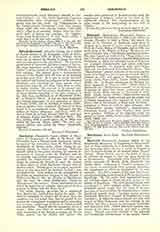

Bercharius (BERERUS), Saint, Abbot of Hautvillers in Champagne, b. 636; d. March 28, 696. Descended from a distinguished Aquitanian family, he received his instruction from St. Nivard (Nivo), Archbishop of Reims, under whose charge he advanced rapidly in virtue and learning. Believing himself called to the sacred ministry, he entered the monastery of Luxeuil under St. Walbert, and by his humble and faithful performance of duty soon excelled his fellow-novices. Upon his return to Reims he induced St. Nivard to erect the cloister of Hautvillers, of which Bercharius himself became the first abbot. Wholly given up to prayer and meditation he also instructed his brethren to lead a contemplative life. Ever zealous for the propagation of the Faith, he founded two cloisters in the Diocese of Chalons-sur-Marne, the one (Puisye or Moutier-en-Der) for men, the other (Pellmoutier, Puellarum Monasterium) for women. These institutions he enriched by donations of valuable relics, procured on a journey to Rome and the Holy Land.
The monk Daguin, provoked by a reprimand from Bercharius, stabbed him during the night. No word of complaint or censure did he utter when the murderer was led before him; but he gloried in exhorting the transgressor to penance and in requesting him to make a pilgrimage to Rome to obtain pardon and absolution. Daguin left the monastery never to return. After two days of severe suffering, the saint succumbed to his wound, a martyr not for the Faith, indeed, but for charity and justice. His remains were preserved at Moutier-en-Der until the suppression of religious orders at the close of the eighteenth century. The commemoration of his name occurs in the martyrology on the 16th of October.
BARNABAS DIERINGER

